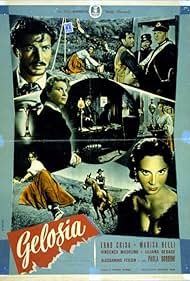A Sicilian nobleman is very jealous of his mistress and when she gets married flies off his handle and commits a murder of which an innocent man is accused. He is however tormented by his co... Read allA Sicilian nobleman is very jealous of his mistress and when she gets married flies off his handle and commits a murder of which an innocent man is accused. He is however tormented by his conscience.A Sicilian nobleman is very jealous of his mistress and when she gets married flies off his handle and commits a murder of which an innocent man is accused. He is however tormented by his conscience.
Photos
Gustavo Serena
- Il medico
- (uncredited)
Storyline
Did you know
- TriviaSeveral changes from the 1942 version: Instead of being killed at night on horseback, Rocco is assassinated in broad daylight as he sings to his new bride and leads the horse drawn carriage through the country side. Instead of being tormented by the sound of horses' hooves, the guilty Marquis thinks he hears the sound of the dead man singing outside his villa. Instead of dying in prison, the innocent man is here shown escaping and later being trapped by police at night and killed in the crossfire. Unlike in the first version there are no little children from the innocent man's family brought into the household of the Marquis.
- ConnectionsEdited into Lo schermo a tre punte (1995)
Featured review
The plot of this movie has great similarity with the crime and punishment - only the motive of the crime wasn't Gold, but love. It also has a commentary on alliance between un-equals - socially deprived vs noble.
Unlike the crime and punishment, this has a much faster pace - but could be called a masterpiece, since that was done without sacrificing the essence of it.
A Marquise falls for a wandering farm-hand's daughter. It had started as carnal infatuation, but then it crossed the border, and became true love. He even took the girl to his manor, positioning her as mistress- of the Manor.
Naturally that tongues started wagging, especially considering that the relationship was serious. The rich baroness aunt had to appear, with a cousin, the Marquis' childhood companion and another girl (Baroness' daughter?) in toe. Finally they could manage to break the bond - or seemingly break it. The Marquis compromised, by getting the girl married to his trusted lieutenant, but "only for name-sake". Then he had his doubts on the newly-wed husband's intentions, especially considering that he was a known philanderer, and before he reaches his home, shoots him dead. The man had quite a few enemies, especially the village young girl's fathers, and one of them was tried and convicted, not for a short sentence (honor killing), but for thirty years on premeditated murder. With the crime and the conscience gnawing in him, the rest is his struggle against it. This had been beautifully brought out, till the very end. The various compromises every one did, he, his love (Agrippina) which refused to die, and even the cousin he later married (Marquise Zossima).
Each of them had done excellent work on their role, probably the cake is taken, naturally, by Erno Crisa (Marquis Antonio).
Only one character I couldn't sympathise with, the Village Priest Don Silvio (Alessandro Fersen). He was one of those who would rather scare people with Devil, rather than sympathise with the fallen, and try to help them redeem. He remained till the end unsympathetic and accusing, almost abetting the man to either completely break-down or commit suicide. In a class -differentiated society, the protagonist too had some limitations, which he didn't seem to appreciate.
An excellent and moving story.
- sb-47-608737
- Dec 28, 2018
- Permalink
Details
- Runtime1 hour 26 minutes
- Color
- Sound mix
- Aspect ratio
- 1.37 : 1
Contribute to this page
Suggest an edit or add missing content






